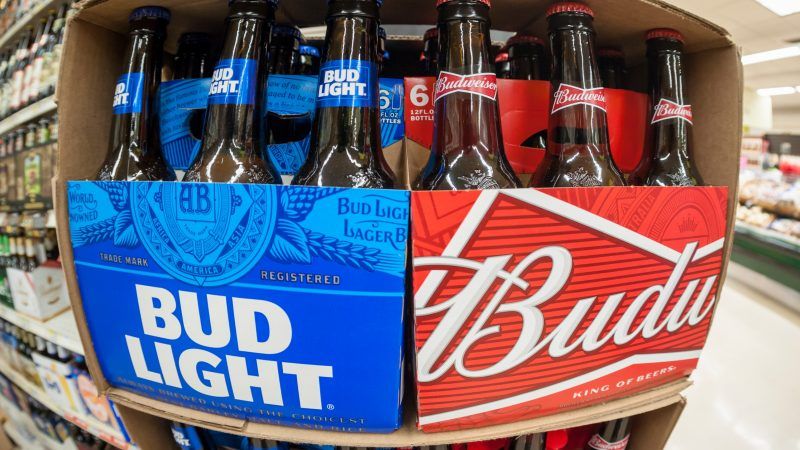A Federal Judge Says Anheuser-Busch Can't Advertise MillerCoors' Use of Corn Syrup
This is bending the Lanham Act until it nearly breaks

One of the best things about the otherwise tedious Super Bowl broadcast earlier this year was the debut of a mildly amusing, medieval-themed Bud Light beer commercial that attacked rivals Miller Lite and Coors Light over the latter two's use of corn syrup as an ingredient in their respective brewing processes.
"Bud Light," one such ad closes. "Brewed with no corn syrup."
That is, by all accounts, a true statement. But it's also one that helped spur MillerCoors, which brews (as its name implies) Miller Lite and Coors Light, to file a federal lawsuit in Wisconsin against Bud Light brewer Anheuser-Busch.
The Bud Light ad, court documents state, "claims that Miller Lite and Coors Light are 'made with' or 'brewed with' corn syrup." All parties to the lawsuit agree that MillerCoors uses corn syrup as an ingredient in brewing both Miller Lite and Coors Light.
The crux of MillerCoors's claims against Anheuser-Busch, then, is that "when viewed as a whole, [the advertisements] deceive[] consumers into believing that Miller Lite and Coors Light final products actually contain corn syrup and thus are unhealthy and inferior to Bud Light."
Corn syrup, a glucose-based sugar, has become a much-derided food ingredient. That's due to the fact it's a type of sugar but, more so, to its relation to high fructose corn syrup (also known as HFCS, a sweeter mix of glucose and fructose). Indeed, MillerCoors claims Bud Light is using the relationship to "exploit or further misconceptions about corn syrup and high fructose corn syrup."
The MillerCoors complaint also claims in part that Bud Light "fails to inform consumers" that Miller Lite and Coors Light don't brew beer with HFCS and that when consumers buy Miller Lite or Coors Light, the products they buy contain no corn syrup.
The MillerCoors complaint centers on a deceptive-advertising claim under the federal Lanham Act. The basic premise underlying the Lanham Act's application here is that if a company's communications (advertising, marketing, packaging, and the like) intentionally mislead the public in such a way that harms that company's competitor(s), then the competitor(s) may seek redress under the law.
MillerCoors has asked the court to issue an injunction and award monetary damages.
In May, U.S. District Court Judge William M. Conley granted some of what MillerCoors has sought. He issued a preliminary injunction that barred Budweiser from implying in its advertising that Miller Lite—as sold to consumers—contains corn syrup.
Now, in a brief order issued last week, Judge Conley has upped the ante, extending his injunction to Bud Light's packaging, which has included the words "no corn syrup" printed on packaging and store displays.
"With this ruling, we are holding Bud Light accountable for their actions, and we will keep holding their feet to the fire every time they intentionally mislead the American public," MillerCoors CEO Gavin Hattersley said in a statement that was reported by The New York Times last week.
Anheuser-Busch, hardly cowed, immediately appealed the ruling and debuted two new ads.
"MillerCoors[] has publicly acknowledged that Miller Lite and Coors Light are both brewed with corn syrup," a company spokesperson said in the wake of the ruling. "We publicly acknowledge that Bud Light is brewed with no corn syrup. These are simply the facts on which everyone agrees. Not only are we appealing this decision, we will continue providing consumers with the transparency they demand, including by informing beer drinkers that Bud Light is brewed with no corn syrup."
University of Pennsylvania Professor Yoram Wind, an expert hired by MillerCoors to study the impact of the Bud Light advertisements on consumers, noted that most of his study participants who saw an ad believed both that Miller Lite and Coors Light use corn syrup in the brewing process and that there is "corn syrup in the Miller Lite and Coors Light you drink."
Did Bud Light intentionally mislead consumers by making truthful statements? The court has said the strongest argument made by MillerCoors is that the record shows Anheuser-Busch "was both aware of and intended to exploit consumer concerns about corn syrup (and high fructose corn syrup in particular)."
Any such confusion appears to have been stoked thanks to comments made by senior Anheuser-Busch staffers. Andy Goeler, head of marketing for Bud Light, said in discussing the ad campaign that "consumers generally don't differentiate between high fructose corn syrup and corn syrup, and that it is a major triggering point in choosing brands to purchase." Another senior Anheuser-Busch official, the lawsuit states, said beer drinkers don't want to "put[] something like corn syrup, if they had a choice, into their body."
Those comments are undoubtedly disingenuous, a defect the Bud Light ad itself also suffers from. After all, other beers, ciders, and beverages produced by Anheuser-Busch do, in fact, contain corn syrup.
There's little doubt Bud Light is capitalizing on consumers' growing aversion to HFCS. But is that against the law? Why shouldn't Bud Light use truthful statements to mock its competitors if it so chooses? Sure, the cans of Miller Lite and Coors Light your dad buys contain neither HFCS nor corn syrup. But they're both brewed with the latter. That is factually true. Was the Lanham Act really intended to prohibit literally true statements, to punish those companies that make such statements, and to protect companies that feel victimized by the truth? I think not.
That's why this case borders on the preposterous. If anything, MillerCoors should direct its ire (if not its attorneys) at the senior Anheuser-Busch employees who may or may not have disparaged Miller Lite and Coors Light. Better still, MillerCoors should take its fight with Bud Light to the court of public opinion. Instead of complaining about Bud Light's ads, MillerCoors should respond with a campaign of its own. Hopefully, they'll see the lite.


Show Comments (106)